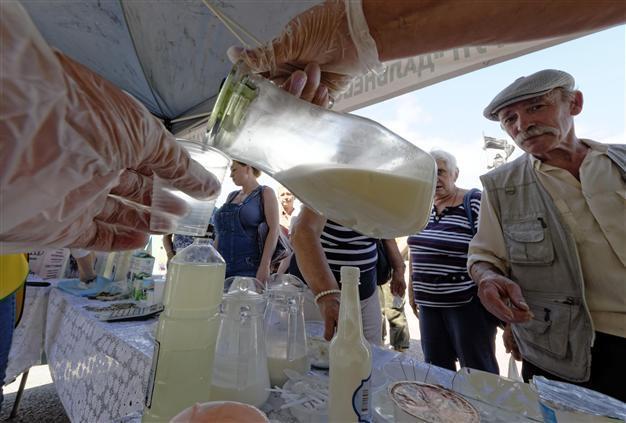Russia, Turkey clear way for milk exports
İZMİR - Anadolu Agency

A vendor pours milk for people to sample during an agricultural fair organized by local food producers in the far eastern Russian port of Vladivostok Sept. 10. REUTERS Photo
Turkey may start exporting dairy products to Russia starting Oct. 15 amid the Kremlin’s continuing trade dispute with the United States and the European Union, with talks between Ankara and Moscow on harmonizing regulations nearing completion, according to a sector leader.However, sector representatives said Turkey would have a difficult time in fulfilling the Russian demand in terms of both quality and quantity.
Russia responded to Western sanctions against its policies on Ukraine by banning fruit, vegetables, meat, fish, milk and dairy imports from the United States, the European Union, Australia, Canada and Norway, on Aug. 7.
The embargo offers new opportunities for Turkey, said Harun Çallı, the head of the Packaged Milk and Dairy Products Association, in an interview with Anadolu Agency.
The obstacles on selling dairy products to Russia were removed after talks between the Turkish Agriculture Ministry and the Russian Plant Quarantine Services, he said.
“Even gaining a 5 percent share in the Russian market would be a great earning for the sector,” he said.
Dairy industrialists recently visited Russia to inspect the market, he said, noting that 80 percent of Turkish firms fulfill requirements to conduct dairy exports to Russia.
Turkey ranks 16th in world milk production and has been increasing output around 10 percent a year.
“Turkey needed a market to meet such growth in milk production,” Çallı said. “Thus, Russia emerged as a good opportunity.”
Still, Turkish output is likely to fall short in meeting the needs of the Russian market in full, he said, while predicting that the country’s dispute with the U.S. and the EU would not last long.
Adnan Yıldız, head of milk, meat and breeding cattle producers association TÜSEDAD, said Russia was demanding EU-standard products and that Turkey had to raise its production quality if it hopes to acquire a sustainable foothold in the Russian market. Only large facilities, of which there are 14, in Turkey meet such standards, he told Anadolu.
Mahmut Eskiyörük, a local sector leader from Tire in the Aegean province of İzmir, said some food
products were returned by Russia as they failed to fulfill Russian standards.
“The future of stockbreeding is in exports but we do not have enough products of export standard,” he said.
Officials in Turkey have predicted a near-doubling of their fruit and vegetable exports to Russia. Turkey is currently the fifth biggest exporter of food to Russia, its neighbor across the Black Sea, making sales worth $1.68 billion last year.
Russia’s food imports from the countries that have now been subjected to sanctions was worth about $9 billion annually.
Turkey is seeking to engage in a long-term trade alliance with Russia, Turkish Agriculture Minister Mehdi Eker said a week after the embargo decision.
















